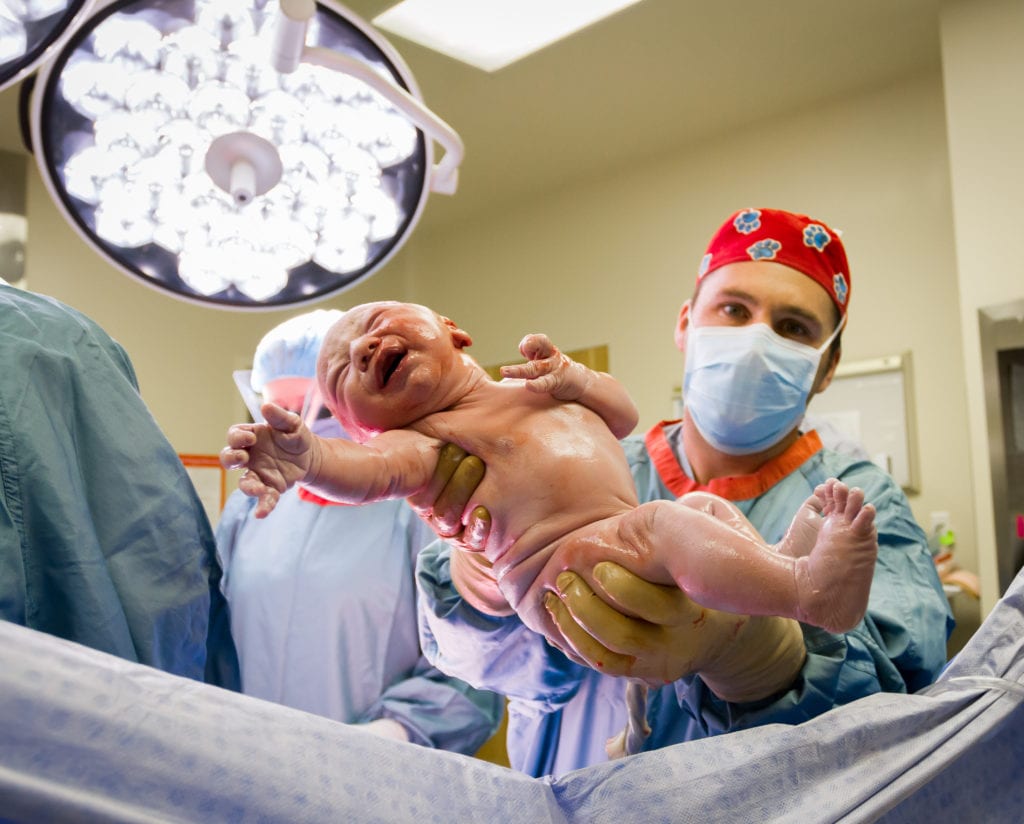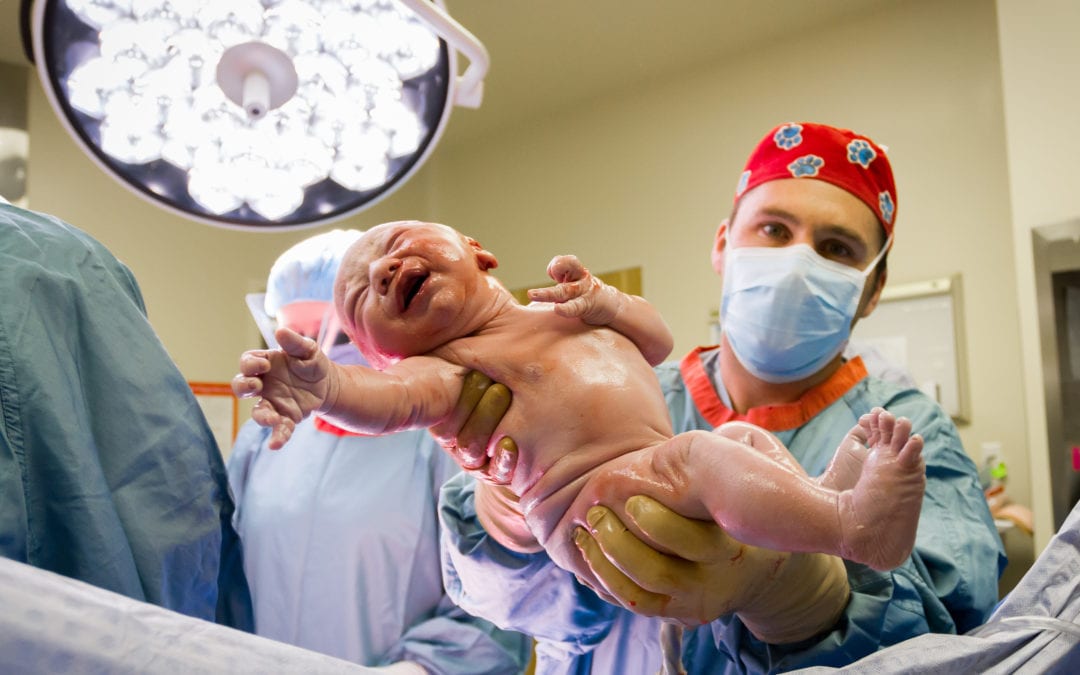
Whether your c-section was planned months before your little one made their debut or you had an emergency c-section, your doctor probably went over what to expect during the surgery. What you may not have been prepared for, however, is the recovery period after getting a c-section. Preparing ahead of time for what to expect will help you as you navigate taking care of your little one and yourself after delivery.
How You Will Really Feel After a C-Section
With the popularity of celebrities opting for c-sections in order to plan for their baby’s delivery, many moms get the impression that a c-section is easier than labor. While you don’t actually have to push your little one out during a c-section, the recovery is much more difficult than a vaginal birth.
Immediately after your c-section, you may feel nauseated, groggy and itchy. This is due to the anesthesia, pain medications and antibiotics that you received before and during your surgery. If these side effects make you feel miserable, talk with your doctor. He or she can give you some additional medications to counteract the effects.
Most anesthesiologists administer a drug with morphine in it that has an effect for 12 to 24 hours. During this time, you will still feel some pain, but it will be minimized by the morphine. After the morphine wears off, your incision will be painful and tender. Let the nurses know when you feel uncomfortable, and they will administer additional medications to you.
Timeline for C-Section Recovery
Hour One
After your sutures are complete, your little one will head off to the nursery to be cleaned and checked over, and you will be brought to a postoperative room. The nurses will monitor your blood pressure, vaginal bleeding, body temperature and ensure that the epidural or spinal block is wearing off by having you wiggle your toes and raise your legs.
Day One
As long as there are no complications, you will be wheeled out of the postoperative room and into your hospital room after several hours. You will be on a liquid diet (ice chips, water, juice, broth and gelatin) until you pass gas. This is to ensure that your digestive system is working properly after surgery.
Nurses will come in regularly to check your legs for blood clots, monitor any swelling you have, check your blood pressure and massage your uterus. Your nurse will also encourage you to get out of bed and go for a short walk. You will probably feel like you never want to leave your bed at this point, but going on a walk will help you recover from your c-section and help prevent blood clots from forming.
As soon as your little one is ready, he or she will be brought to you. Breastfeed as early and as often as possible. Don’t be afraid to ask your partner or the nurses for help in lifting and positioning your little one in order to be able to comfortably nurse.
Day Two
Your catheter and IV will most likely come out two days after your c-section. This means that you won’t have to avoid getting tangled up with the uncomfortable catheter anymore (yay!), but it also means that you will have to get up and use the restroom regularly. This also means that pain medications will no longer be able to be administered through your IV, so you will need to let your nurse know as soon as you start to feel uncomfortable so that you can take medication orally.
The nurses will urge you to walk as often as possible. If your hospital has wheeled bassinets, take your little one with you on your walks. You will be encouraged to take a shower, which will make you feel more like yourself again. You should carefully wash your incision with mild soap and water. Don’t be freaked out by the appearance of your incision; the swelling and redness will fade over time.
Days Three to Four
Depending on your doctor’s orders and your recovery, you may be released to go home three to four days after your c-section. If possible, send your partner, friend or family member out to fill your pain medication prescription and to pick up some extra-long pads before you leave the hospital. You will have to wear pads (no tampons allowed) for one to two weeks while your body continues to shed the extra blood, uterine tissue and mucus.
Before you leave, the nurses will instruct you on how to care for your incision and what complications to look out for (extreme redness, discharge, burning pain). You won’t be able to drive or go upstairs for at least one week, and you won’t be allowed to lift anything heavier than your baby for at least two weeks.
Two Weeks
You will visit your doctor two weeks after your baby was delivered. He or she will check over your incision, blood pressure, swelling, uterine size and ask about your mood in order to determine if you have postpartum depression. You will probably already be exhausted from staying up with your little one at this point, so make sure to write down any questions you may have ahead of time.
Six Weeks
After six weeks, you should be feeling pretty good. Typical c-section recovery takes between four and six weeks. You will visit your doctor one last time for a final check. As long as there are no complications, you will be given the green light to have sex and use tampons once more.
Dos and Don’ts of C-Section Recovery
- Do take your medications regularly. They will help you feel good enough to take care of your little one and help to reduce inflammation.
- Do ask for help from your partner, friends and family.
- Don’t be afraid to talk with your doctor if you are feeling depressed.
- Don’t push yourself to do too much; everyone’s recovery is different.
- Don’t be upset if your delivery didn’t go as planned. The most important thing to remember is that you and your little one are healthy and safe.
Breastfeeding After a C-Section
Breastfeed your little one as soon as your able to do so. If he or she is in the NICU, use a hospital breast pump in order to pump regularly. This will encourage your milk to come in, and the colostrum and milk that are pumped will be used to feed your baby. When you aren’t nursing, hold your little one skin-to-skin often. This will help you and your little one bond.
Your incision will be very painful soon after your surgery, so it’s important to not put any pressure on it. This means you may need to adjust your breastfeeding position during the first several weeks. Instead of a traditional cradle hold, try using a football or clutch position.
Remind your doctor that you intend to breastfeed. They will prescribe pain medications that won’t affect your little one adversely. A small amount of pain medication may be ingested by your baby, which could make him or her a little more sleepy. It’s important to continue to take your pain medications, however. Pain interferes with your body releasing the hormone oxytocin, which is responsible for releasing the milk into your milk ducts.
After your c-section, it may seem like you won’t ever feel like yourself again. Be patient with yourself, take your pain medications regularly and ask for help. It won’t be long before the pain fades and your energy returns.


 Complete Our Simple Online Form
Complete Our Simple Online Form We’ll Handle All The Paperwork
We’ll Handle All The Paperwork Receive Your Free Ameda Pump
Receive Your Free Ameda Pump